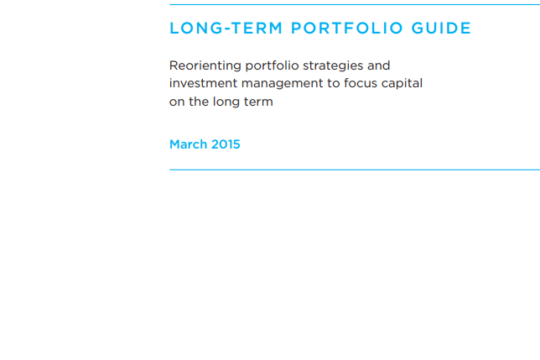
An upcoming project will expand on our model for long-term investment mandates and create new tools for investors to lay the foundation for generating stronger returns.

An upcoming project will expand on our model for long-term investment mandates and create new tools for investors to lay the foundation for generating stronger returns.
By Joel Paula
Investment mandates, the contracts that define the relationship between asset managers and asset owners, are a critical tool in fulfilling long-term objectives. Without these contracts, it would be difficult to reconcile the constraints and objectives of asset owners with the capabilities of asset managers. Mandates ensure there is mutual alignment on investment goals, bolstering these collaborative partnerships over time and, when crafted with long-term goals in mind, lay the foundation for generating stronger returns.
But the terms and language included in investment mandates are often boilerplate, overlooking provisions that can make relationships more long-term and mutually beneficial.
FCLTGlobal’s research on the importance of mandates began in 2015 with the publication of the Long-term Portfolio Guide, which identified the investment mandate as one of the five key action areas for creating long-term alignment. This work was the basis for the first two editions of Institutional Investment Mandates: Anchors for Long-Term Performance, which recommends important terms and questions investors can use to navigate mandate negotiations in a way that would build trust between both parties and advance their joint investment goals.
Over the past five years, we have convened some of the world’s largest and most influential asset owners and asset managers – representing over USD 8.3 trillion in assets under management – to develop contract provisions and practical tools to help with their implementation. This work, which includes a “top ten” list of key elements of long-term mandates and a practical model for long-term contract provisions, proved so relevant among the investment community that a third edition is underway.
In this latest iteration, we aim to expand on our model for long-term contract provisions and key performance indicators, as well as develop a series of new tools that draw on these expansions, by:
FCLTGlobal’s model mandate is already having real-world impact. Co-founder Henrique Alvares of Neo Investimentos, a Brazil-based asset manager, has used reporting techniques as a way of making a first impression and emphasizing to client investors who they are as an asset manager:
“When we saw FCLTGlobal’s recommendation to switch the reporting of financial returns from longest to shortest, we immediately applied it. The emphasis we put in our long-term investment approach is now better understood by our audience, in a very simple and straightforward way” he said.
The adoption of strategic long-term behavior supports the future-oriented allocation of capital across the investment value chain, paving the way for a more sustainable and prosperous economy. Well-designed mandates are a fundamental tool in this effort.

Toolkit
5 December 2017 - Based on a series of working groups with leading asset owners and asset managers from around the world, we offer this list of questions to anchor investment mandate negotiations in a long-term direction.

Incentive Alignment | Report
15 May 2020 - Ensuring assets are managed in line with these long-term horizons is critical to achieving these goals. This presents a challenge, however, because assets are often managed by asset managers, distinct from the asset owners, and they may have different time horizons, incentives, and goals. Among the most important elements in ensuring that institutional investor partnerships fulfill long-term objectives are the investment management contracts between asset owners and asset managers, the “mandates.” The terms and conditions embodied in these mandates constitute a mutual mechanism to align the...

Report
23 March 2015 - In a recent survey of public and private pension plans and sovereign-wealth fund managers, respondents overwhelmingly agreed that while the ability to invest long term is an advantage, they do not necessarily have an effective set of implementation strategies/tools to help them realize their aspirations to be long term.